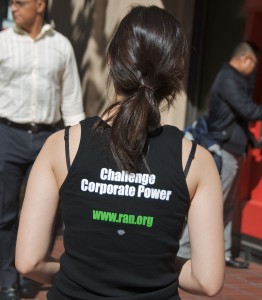 The anniversary of the Citizens United ruling this January 21 promises to be monumental. For all of us working day and night on behalf of people and the environment, January 21, 2012 marks two years to the day since the advent of one of the most egregious ‘rules of the game’ weighting our economy and democracy in favor of big money and against community health and a stable climate. And it comes at a moment when Americans have been primed to think more broadly and deeply about the economy, inequality, and the need for change.
The anniversary of the Citizens United ruling this January 21 promises to be monumental. For all of us working day and night on behalf of people and the environment, January 21, 2012 marks two years to the day since the advent of one of the most egregious ‘rules of the game’ weighting our economy and democracy in favor of big money and against community health and a stable climate. And it comes at a moment when Americans have been primed to think more broadly and deeply about the economy, inequality, and the need for change.
Prior to the Citizens United Supreme Court decision there was already huge corporate influence over our elections. What Citizens United did was give corporations the same rights of ‘free speech’ that individuals enjoy under the Constitution — a particularly undemocratic principle given that most corporations’ pockets are much, much deeper than the average individual’s. Now corporations with a vested interest in, say, keeping the scales of power tipped in favor of coal or oil — despite the devastating effects of fossil fuels on communities and the climate — can ensure their interests are protected by spending unlimited amounts of money to influence elections. Citizens United overturned a century of campaign finance laws and put our democracy on the block for the highest bidder.
This should be of concern to everyone. Big corporations can now essentially buy politicians who will write and pass rules that favor them and their industries.
This is why we have a president who couldn’t pass climate legislation and who is now stuck in an endless game of appeasement — weighing each small action that might shift the country off of fossil fuels and into renewable energy against the mountains of cash that the coal, oil, and agribusiness industries could spend defeating him in the next election. This is also why we have a government incapable of committing to a renewed Kyoto Protocol in spite of its lofty rhetoric — even though scientists are telling us that 2010 saw the highest jump in C02 emissions on record.
For more than a quarter of a century, Rainforest Action Network and many of our allies have been pushing corporations to change the way they do business to protect rather than destroy communities and the environment. We’ve gotten pretty good at it, and there’s no question that corporate campaigning has led to some real victories: protecting millions of acres of rainforest around the world, stopping many terrible industrial projects, and convincing most of the world’s major banks to adopt environmental policies on their investments, to name just a few. All these campaigns are incrementally creating real change in the business world and are undeniably necessary to stop some of the worst abuses caused by the unchecked drive for profit.
But alone, all the voluntary agreements from corporations we can win are not sufficient to generate the type of long-term transformation needed in our economy to tackle the biggest environmental and human rights issues of our times. Most alarmingly, they are not enough to solve global climate change.
Corporations themselves are victims and beneficiaries of a regulatory system that myopically values profit and shareholder value above all else. Even with the best intentions in the world, the CEOs of most companies can only do so much to change their business practices before they risk running afoul of the doctrine of the dollar. This is not news. Any smart campaigner will tell you that we need systemic change to meaningfully confront the breakdown of our economy and our environment. And until now, this larger aim of changing the rules of the game has been largely ignored by corporate campaigners because, quite frankly, it seemed impossible.
But today we are presented with a rare moment — one where the window for deep change has been cracked open and changing the rules of the game suddenly seems possible.
We are in a moment, thanks to the emergence of the Occupy Movement, where critiques of the economy have gone from the fringe to being the substance of major news coverage, and where concerns have moved beyond simple cries of foul play to a deep questioning of the corporate model ruling so much of our world. The question before all of us is: How do we unite our efforts to drive through changes to our tax system, our trade system, our electoral system, and our judicial system that will reverse the balance of power and put citizens in charge of corporations rather than the other way around?
Challenging Citizens United is just a step in the direction of demanding structural change, but it is a bold one. I invite you to join the growing mass of groups and activists on January 21 to stand up to Citizens United and the corporations who are benefiting from it. Let’s Occupy the Corporations that day, letting those companies who are buying our democracy know that democracy is by the people and for the people. Let’s show them what democracy looks like: real citizens with bodies and souls marching on the streets and standing outside boardrooms to create a country that works for the majority, not just the few. Plans are still evolving, so stay tuned at ran.org for ways to plug in and be part of the action.